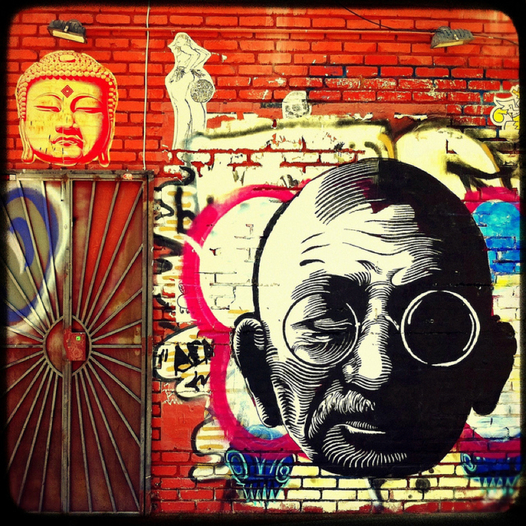|
Georges Simenon was one of the most prolific novelists of the twentieth century, publishing 425 books in his career, including more than 200 works of pulp fiction under 16 different pseudonyms, as well as 220 novels in his own name and three volumes of autobiography. Remarkably, he didn’t write every day.
The Belgian-French novelist worked in intense bursts of literary activity, each lasting two or three weeks, separated by weeks or months of no writing at all. Even during his productive weeks, Simenon didn’t write for very long each day. His typical schedule was to wake at 6:00 A.M., procure coffee, and write from 6:30 to 9:30. Then he would go for a long walk, eat lunch at 12:30, and take a one-hour nap. In the afternoon he spent time with his children and took another walk before dinner, television, and bed at 10:00 P.M. Simenon liked to portray himself as a methodical writing machine—he could compose up to eighty typed pages in a session, making virtually no revisions after the fact—but he did have his share of superstitious behaviors. No one ever saw him working; the “Do Not Disturb” sign he hung on his door was to be taken seriously. He insisted on wearing the same clothes throughout the composition of each novel. He kept tranquilizers in his shirt pocket, in case he needed to ease the anxiety that beset him at the beginning of each new book. And he weighed himself before and after every book, estimating that each one cost him nearly a liter and a half of sweat. Simenon’s astonishing literary productivity was matched, or even surpassed, in one other area of his daily life—his sexual appetite. “Most people work every day and enjoy sex periodically,” Patrick Marnham notes in his biography of the writer. “Simenon had sex every day and every few months indulged in a frenzied orgy of work.” When living in Paris, Simenon frequently slept with four different women in the same day. He estimated that he bedded ten thousand women in his life. (His second wife disagreed, putting the total closer to twelve hundred.) He explained his sexual hunger as the result of “extreme curiosity” about the opposite sex: “Women have always been exceptional people for me whom I have vainly tried to understand. It has been a lifelong, ceaseless quest. And how could I have created dozens, perhaps hundreds, of female characters in my novels if I had not experienced those adventures which lasted for two hours or ten minutes?” Daily Rituals: How Artists Work by Mason Currey No plan of operations extends with certainty beyond the first encounter with the enemy’s main strength.”
Or, as Mike Tyson said, “Everyone has a plan until they get punched in the face.” You have to find a way to survive that adjustment period of shock and help others get through it. You have to find a way to limit denial. The place to start is with the opposite of denial: acceptance. If you have the imagination to accept that aliens are invading or that the dead are walking, then you’ll have the imagination to accept that this earthquake is indeed the Big One. The more you can accept that things have changed, the less time you’ll waste on denial and “milling” (disaster-speak for checking in with other people and doing nothing) and the sooner you will take action. If the shit really hits the fan, I’ll take a semi-decent plan right now over a good plan in ten minutes or a perfect plan later. The faster you can accept that everything has changed, that everything you’ve worked for all your life is now gone, the better off you’ll be during the apocalypse. I’m not talking about actually redefining reality; I’m talking about adopting an attitude—“What’s right in front of me?” It’s about looking at what you see without preconceptions. If you start limiting your emergency plans to only what you think is likely, then you’re screwed. The Disaster Diaries: How I Learned to Stop Worrying and Love the Apocalypse by Sam Sheridan . . . just as a matter of interest, tell me something: how long do you sleep each night?
The proverbial eight hours. Ask anyone and they say automatically ‘eight hours’. As a matter of fact you sleep about ten and a half hours, like the majority of people. I’ve timed you on a number of occasions. I myself sleep eleven. Yet thirty years ago people did indeed sleep eight hours, and a century before that they slept six or seven. In Vasari’s Lives one reads of Michelangelo sleeping for only four or five hours, painting all day at the age of eighty and then working through the night over his anatomy table with a candle strapped to his forehead. Now he’s regarded as a prodigy, but it was unremarkable then. How do you think the ancients, from Plato to Shakespeare, Aristotle to Aquinas, were able to cram so much work into their lives? Simply because they had an extra six or seven hours every day. The Complete Stories of J. G. Ballard by J. G. Ballard The best mentors are often those who have wide knowledge and experience, and are not overly specialized in their field—they can train you to think on a higher level, and to make connections between different forms of knowledge.
The paradigm for this is the Aristotle–Alexander the Great relationship. Philip II, Alexander’s father and king of Macedonia, chose Aristotle to mentor his thirteen-year-old son because the philosopher had learned and mastered so many different fields. He could thus impart to Alexander an overall love of learning, and teach him how to think and reason in any kind of situation—the greatest skill of all. This ended up working to perfection. Alexander was able to effectively apply the reasoning skills he had gained from Aristotle to politics and warfare. To the end of his life he maintained an intense curiosity for any field of knowledge, and would always gather about him experts he could learn from. Aristotle had imparted a form of wisdom that played a key role in Alexander’s success. Mastery by Robert Greene The model goes like this:
You want to learn as many skills as possible, following the direction that circumstances lead you to, but only if they are related to your deepest interests. Like a hacker, you value the process of self-discovery and making things that are of the highest quality. You avoid the trap of following one set career path. You are not sure where this will all lead, but you are taking full advantage of the openness of information, all of the knowledge about skills now at our disposal. You see what kind of work suits you and what you want to avoid at all cost. You move by trial and error. This is how you pass your twenties. You are the programmer of this wide-ranging apprenticeship, within the loose constraints of your personal interests. You are not wandering about because you are afraid of commitment, but because you are expanding your skill base and your possibilities. At a certain point, when you are ready to settle on something, ideas and opportunities will inevitably present themselves to you. When that happens, all of the skills you have accumulated will prove invaluable. You will be the Master at combining them in ways that are unique and suited to your individuality. You may settle on this one place or idea for several years, accumulating in the process even more skills, then move in a slightly different direction when the time is appropriate. In this new age, those who follow a rigid, singular path in their youth often find themselves in a career dead end in their forties, or overwhelmed with boredom. The wide-ranging apprenticeship of your twenties will yield the opposite—expanding possibilities as you get older. Mastery by Robert Greene You must value learning above everything else. This will lead you to all of the right choices.2/25/2013
You must value learning above everything else. This will lead you to all of the right choices.
You will opt for the situation that will give you the most opportunities to learn, particularly with hands-on work. You will choose a place that has people and mentors who can inspire and teach you. A job with mediocre pay has the added benefit of training you to get by with less—a valuable life skill. If your apprenticeship is to be mostly on your own time, you will choose a place that pays the bills—perhaps one that keeps your mind sharp, but that also leaves you the time and mental space to do valuable work on your own. You must never disdain an apprenticeship with no pay. In fact, it is often the height of wisdom to find the perfect mentor and offer your services as an assistant for free. Happy to exploit your cheap and eager spirit, such mentors will often divulge more than the usual trade secrets. In the end, by valuing learning above all else, you will set the stage for your creative expansion, and the money will soon come to you. Mastery by Robert Greene If you are deliberately trying to create a future that feels safe, you will willfully ignore the future that is likely. - Seth Godin, Linchpin: Are You Indispensable People will compromise on the really important shit in order to save a little money. I, however, am not like that so let me give you two pieces of advice here.
First, know the value of your time. I know that I’ve already said that a bunch of times and you’ll probably hear it from me another time before we’re done because it’s so important. I paid sticker price for the last car I bought. The single reason I did this was because my time is worth a lot more when I’m in the office working than if I’m saving 2 grand haggling over the price of the car. Some people might call me a chump for at least not trying, but I call it smart. I can’t afford to waste my precious time like that. Secondly, don’t be cheap out on the important stuff. I spend most of my life in my computer chair and in my bed. So I bought the top of the line Herman Miller Aeron and a pimped out Sleep Number mattress. Again, to me, that’s just smart. I want my ass to be happy. A comfortable chair, a good bed and an awesome wife. That’s a perfect recipe for happiness. Everything else you can take in stride and figure out, even if it’s stuff that seems impossible at the time. Nothing's Changed But My Change by Jeremy Schoemaker, Kate Sprouse You only have to do a few things right in your life so long as you don’t do too many things wrong. -Warren Buffett
I believe that things die (like your creativity and your excitement) when you stay in your comfort zone. So you have to keep asking yourself— are you doing things that scare you shitless or are you happy to live in a comfort zone that is below your potential? That goes for work AND life. I am constantly pushing myself in my work, whether it’s giving a blind talk at a huge conference or starting a new venture. I am a revolutionary. And the thing is, well, revolutionary means doing something completely new and out-there. If everybody else is already doing it, it ain’t new. And if no one is doing what you’re doing, well then—you’re all alone. You’re taking a leap and that can be scary shit. I have always done this in my life. I’m always leaping and I never know exactly where I’m going to land. Nothing's Changed But My Change by Jeremy Schoemaker, Kate Sprouse When you are faced with deficiencies instead of strengths and inclinations, this is the strategy you must assume:
ignore your weaknesses and resist the temptation to be more like others. Instead, like Temple Grandin, direct yourself toward the small things you are good at. Do not dream or make grand plans for the future, but instead concentrate on becoming proficient at these simple and immediate skills. This will bring you confidence and become a base from which you can expand to other pursuits. Proceeding in this way, step by step, you will hit upon your Life’s Task. Understand: Your Life’s Task does not always appear to you through some grand or promising inclination. It can appear in the guise of your deficiencies, making you focus on the one or two things that you are inevitably good at. Working at these skills, you learn the value of discipline and see the rewards you get from your efforts. Like a lotus flower, your skills will expand outward from a center of strength and confidence. Do not envy those who seem to be naturally gifted; it is often a curse, as such types rarely learn the value of diligence and focus, and they pay for this later in life. This strategy applies as well to any setbacks and difficulties we may experience. In such moments, it is generally wise to stick to the few things we know and do well, and to reestablish our confidence. Mastery by Robert Greene I am running around Las Vegas this week and saw these statues, and had to take a picture.
2012 was a good year, and I have a lot going on, so I really think I need to stay focused and continue to improve. The year being good made me think of this quote, which basically says it all, that it is just when all is good and everything is going the right way that you need to double up on the discipline and focus. If things keep going well, you will continue to improve and if they suddenly go differently than planned, you are already in motion and not just coasting. "After victory, tighten the straps on your helmet." -- Tokugawa Ieyasu The Third and Final "Great Unifier" of Japan, Founder of the Tokugawa Shogunate That Ruled Japan For 250 Years |
Click to set custom HTML
Categories
All
Disclosure of Material Connection:
Some of the links in the post above are “affiliate links.” This means if you click on the link and purchase the item, I will receive an affiliate commission. Regardless, I only recommend products or services I use personally and believe will add value to my readers. I am disclosing this in accordance with the Federal Trade Commission’s 16 CFR, Part 255: “Guides Concerning the Use of Endorsements and Testimonials in Advertising.” |
Photos from Wesley Oostvogels, Thomas Leuthard, swanksalot, Robert Scoble, Lord Jim, Pink Sherbet Photography, jonrawlinson, MonsterVinVin, M. Pratter, greybeard39, Stepan Mazurov, deanmeyersnet, Patrick Hoesly, Lord Jim, Dcysiv Moment, fdecomite, h.koppdelaney, Abode of Chaos, pasa47, gagilas, BAMCorp, cmjcool, Abode of Chaos, faith goble, nerdcoregirl, Adrian Fallace Design & Photography, jmussuto, Easternblot, Jeanne Menjoulet & Cie, aguscr, h.koppdelaney, Saad Faruque, ups2006, Unai_Guerra, erokism, MsSaraKelly, Jem Yoshioka, tony.cairns, david drexler, Reckless Dream Photography, Raffaele1950, kevin dooley, weegeebored, Cast a Line, Zach Dischner, Eddi van W., kmardahl, faungg's photo, Alan Light, acme, Evan Courtney, specialoperations, Mustafa Khayat, darkday., Orin Zebest, Robert S. Donovan, disparkys, kennethkonica, aubergene, Nina Matthews Photography, infomatique, Patrick Hoesly, j0sh (www.pixael.com), SmithGreg, brewbooks, tjsander, The photographer known as Obi, Simone Ramella, striatic, jmussuto, m.a.r.c., jfinnirwin, Nina J. G., pellesten, dreamsjung, misselejane, Design&Joy, eeskaatt, Bravo_Zulu_, No To the Bike Parking Tax, Kecko, quinn.anya, pedrosimoes7, tanakawho, visualpanic, Brooke Hoyer, Barnaby, Fountain_Head, tripandtravelblog, geishaboy500, gordontarpley, Rising Damp, Marc Aubin2009, belboo, torbakhopper, JarleR, aakanayev, santiago nicolau, Official U.S. Navy Imagery, chinnian, GS+, andreasivarsson, paulswansen, victoriapeckham, Thomas8047, timsamoff, ConvenienceStoreGourmet, Jrwooley6, DeeAshley, ethermoon, torbakhopper, Mark Ramsay, dustin larimer, shannonkringen, Stf.O, Todd Huffman, B Rosen, Lord Jim, Jolene4ever, Ben K Adams, Clearly Ambiguous, Daniele Zedda, Ryan Vaarsi, MsSaraKelly, icebrkr, jauhari, ajeofj3, jenny downing, Joi, GollyGforce, Andrew from Sydney, Lord Jim, 'Retard' (says University of Missouri), drukelly, Sullivan Ng, jdxyw, infomatique, AlicePopkorn, RAA408, Abode of Chaos, SaMaNTHa NiGhTsKy, as always..., D@LY3D, Angelo González, the sugary smell of springtime!, Marko Milošević, pedrosimoes7, MartialArtsNomad.com, 401(K) 2013, Sigfrid Lundberg, MoneyBlogNewz, NBphotostream, the stag and doe, Jemima G, bablu121, .reid., jared, EastsideRJ, Alex Alvisi, Marie A.-C., geishaboy500, modomatic, starsnostars., Hardleers, Sarah G..., donielle, Danny PiG, bigcityal, || UggBoy♥UggGirl || PHOTO || WORLD || TRAVEL ||, -KOOPS-, seafaringwoman, kingkongirl, Richard Masoner / Cyclelicious, Hans Gotun, gruntzooki, Duru..., Vectorportal, Peter Hellberg, Alexandre Hamada Possi, Santi Siri, Joshua Rappeneker, a little tune, Patricia Mangual, erokism, woodleywonderworks, Philippe Put, Purple Sherbet Photography, Abode of Chaos, greybeard39, swanksalot, greyloch, Omarukai, Marc_Smith, SLPTWRK, Peter Alfred Hess, illum, MarioMancuso, willc2, _titi, Lightsurgery, Rennett Stowe, feverblue, Esteman., Keith Allison, DCist, h.koppdelaney, Mike Deal aka ZoneDancer, Jos Dielis, The Wandering Angel, Nathaniel KS, MsSaraKelly, Frank Lindecke, Kara Allyson, JeremyGeorge, deoman56, gagilas, Xoan Baltar, Luke Lawreszuk, Eric-P, fdecomite, lorenkerns, masochismtango, Adrian Fallace Design & Photography, anarchosyn, -= Bruce Berrien =-, radiant guy, Free Grunge Textures - www.freestock.ca, El Bibliomata, antmoose, Pedro Belleza, Fitsum Belay/iLLIMETER, Nathan O'Nions, denise carbonell, swanksalot, ▓▒░ TORLEY ░▒▓, Marco Gomes, Justin Ornellas, jenni from the block, René Pütsch, eddieq, thombo2, Ben Mortimer Photography, :moolah, ideowl, joaquinuy, wiredforlego, Rafa G. _, derrickcollins, Fishyone1, ben pollard, Admiralspalast Berlin, Georgio, garybirnie.co.uk, fiskfisk, MoreFunkThanYou, xJason.Rogersx, kevin dooley, David Holmes2, Kris Krug, JD Hancock, Images_of_Money, andriux-uk events, Tyfferz, decafinata, jonrawlinson, isado, Lohan Gunaweera, Derek Mindler, Mike "Dakinewavamon" Kline, themostinept, kiwanja, erokism, dktrpepr, Keoni Cabral, denise carbonell, Neal., tonystl, ericmay, Ally Mauro, erokism, Georgie Pauwels, anitakhart, Ivan Zuber, r2hox, Aka Hige, badjonni, striatic, Arry_B, 401(K) 2012, pvera, Lord Jim, Dredrk aka Mr Sky, TerryJohnston, eschipul, wiredforlego, Yuliya Libkina, fabbio, Justin Ruckman, David Boyle, Matthew Oliphant, Keoni Cabral, Thaddeus Maximus, Abode of Chaos, matthias hämmerly, dospaz, LadyDragonflyCC - >;<, CassiusCassini2011, Abode of Chaos, Jorge Luis Perez, infomatique, Mark Gstohl, AliceNWondrlnd, ç嬥x, ssoosay, striatic, NASA Goddard Photo and Video, feverblue, MsSaraKelly, kohlmann.sascha, Vox Efx, country_boy_shane, paularps, Gage Skidmore, HawkinsSteven, Cam Switzer, Arenamontanus, anieto2k, Georgie Pauwels, my camera and me, Lord Jim, nolifebeforecoffee, Joris_Louwes, Kemm 2, VinothChandar, DeeAshley, brewbooks, craigemorsels, Boris Thaser, Poster Boy NYC, ssoosay, guzzphoto, sachac, chefranden, Wanja Photo, Samuel Petersson, onlyart, samsaundersleeds, Ghita Katz Olsen, mcveja, matthewwu88, Victor Bezrukov, JasonLangheine, erokism, vitroid, thethreesisters, charlywkarl, Sharon & Nikki McCutcheon, Ol.v!er [H2vPk], mikecogh, tec_estromberg, noii's, nicholaspaulsmith, Tucker Sherman, Phil Grondin, Cea., Randomthoughtstome, dcobbinau, rafeejewell, pedrosimoes7, lumaxart, marfis75, roland, RLHyde, David Boyle in DC, Sigfrid Lundberg, Thomas Geiregger, Uberto, bgottsab, Conor Lawless, phphoto2010, Steven | Alan, ckaroli, dweekly, AleBonvini, 드림포유, die.tine, MsSaraKelly, equinoxefr, Sarabbit, Abode of Chaos, Galantucci Alessandro, LadyDragonflyCC - >;< - Spring in Michigan!, Alan Gee, Johan Larsson, SoulRider.222, Robert S. Donovan, amslerPIX, cfaobam, Amy L. Riddle, Bladeflyer, Blomstrom, pumpkincat210, Lord Jim, Symic, kevin dooley, pixelthing, Nelson Minar, Fraser Mummery, The Booklight, edenpictures, everyone's idle, betsyweber, h.koppdelaney, ark, Ben Fredericson (xjrlokix), dphiffer, Jeff Kubina, istolethetv, dullhunk, Tambako the Jaguar, fdecomite, The Daily Ornellas, Badruddeen, kevindooley, mnem, Reyes, sadaton, Mary..K, akunamatata, Dennis Vu Photography for Unleashed Media, mitch98000, ganesha.isis, maria j. luque, doneastwest, w00tdew00t, kevindooley, NightFall404, Infrogmation, nandadevieast, darkpatator, Christos Tsoumplekas, sicamp, Hello Turkey Toe, cliff1066™, James Jordan, gailf548, andrew_byrne, infomatique, graphia, -= Bruce Berrien =-, aphrodite-in-nyc, jmussuto, eiko_eiko, Emily Jane Morgan, _Imaji_, kait jarbeau is in love with you, Leeks, h.koppdelaney, paul-simpson.org, Pinti 1, Namlhots, -KOOPS-











 RSS Feed
RSS Feed

